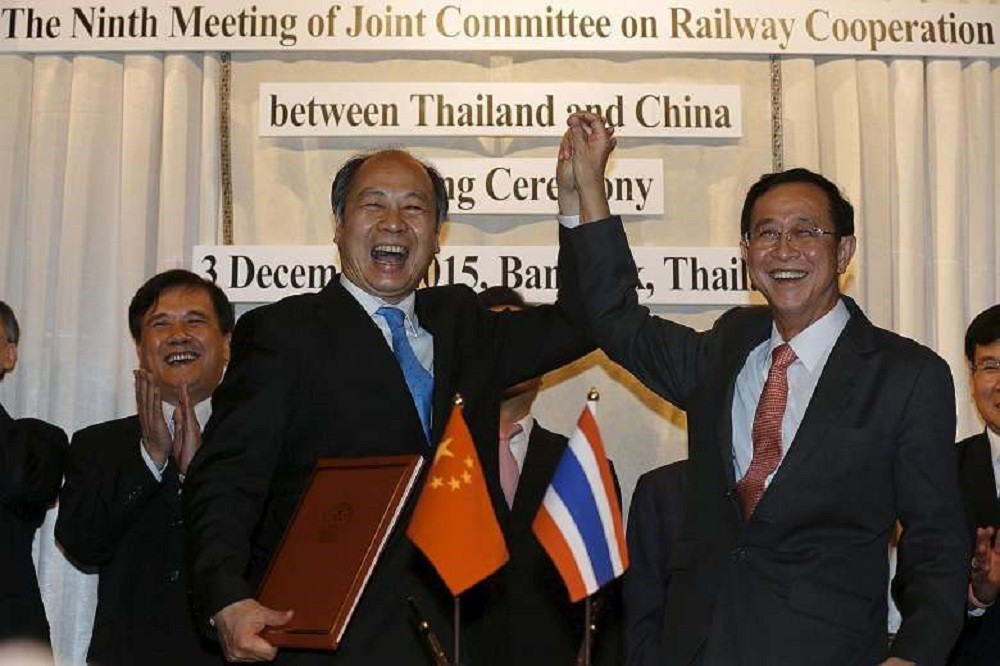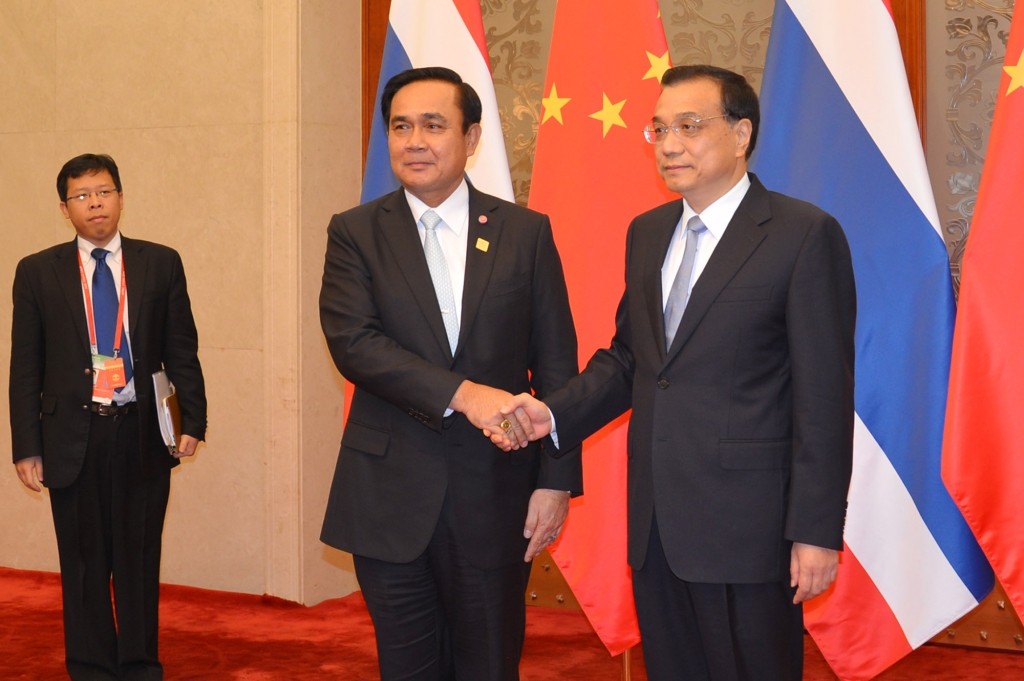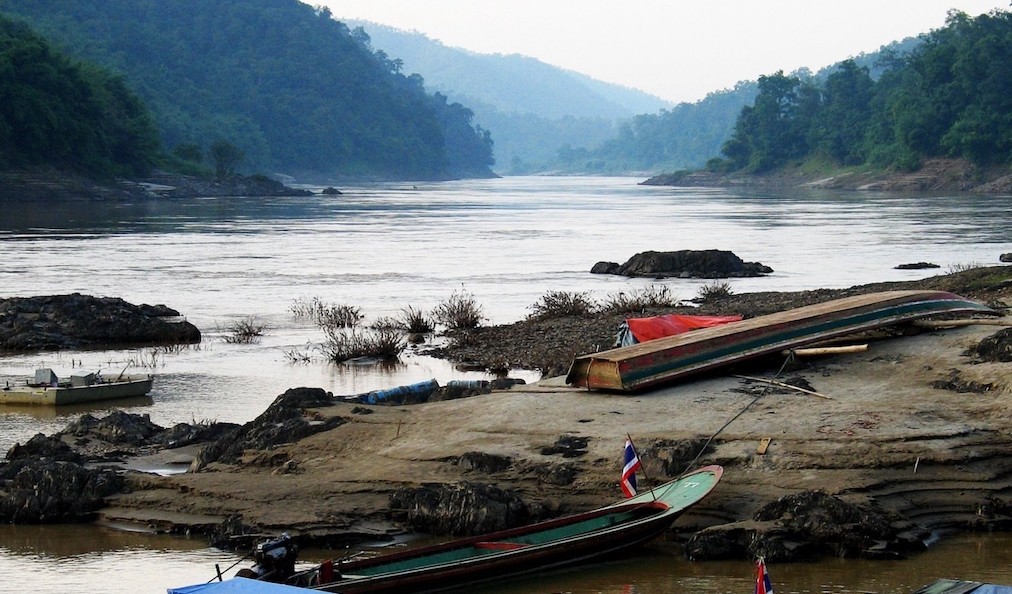A nearly 900 kilometers railway project, China and Thailand has negotiated for ten years. On the occasion of Trans-Asian Railway makes its first appearance of the early harvest, Ta Kung Pao reporters explore and look for opportunities and risks along the railway line. This railway connecting the border of Laos and Bangkok, towards Mada Pu Industrial Park, will be linked with China-Lao railway and reaches KungMing, YunNan province in the end, which draws a giant circulation map which connects China with Laos and Thailand.
“The train in Thailand is not generally slow, it is the slowest in the world.” That is China backpacker Xu Cheng’s description of his experience of taking train in Thailand. There is no airport in Thai Nongkhai, Xu had to go by train from Bangkok to this border town, which took him nearly 20 hours.
Top the best tourist destination for many times, Thailand will receive 32 million overseas tourists this year; however, Thai railway system falls far behind the development of tourism. Thai railway history lasts for a century, but 85% of over 4,000 kilometers operating railways is still monorail with a limiting speed 50 kilometers per hour.
“High–speed rail for rice” with twists and turns
Backward railways not only make people’s life inconvenient, but become an unsolvable problem for all previous Thai governments. In 2006, Thailand once made an attempt until China prime minister Li Keqiang visited Thailand in 2013, and came to an agreement “High-speed rail for rice” with Thai premier YingLuck, which made a substantial progress for Sino-Thai railway cooperation. However, Thailand constitution court thought it as the violation of constitution, so Yingluck had to cancel the project.
Two years later, Dec 3rd, 2015, Thailand and China government signed a framework doc for railway cooperation, and 1 million ton of Thai rice importing contract. On Dec 19th, the groundbreaking ceremony of railway operating center was held in Thai Ayutthaya Chiang Rak Noi railway station.
But there are still some uncertainties of this rail project which cost 530 billion baht (HK $ 117.77 billion). Thai Transport Minister Akon said in a media interview, China had agreed to reduce U. S. dollar lending rate for Bangkok-King, Creek-Nakhon, Ratchasima-Nong Khai and King Creek-Mada Pu two railway lines from 2.5% to 2% that Thai suggested. China’s surging News also confirmed this information from the source, and said both parties were still negotiating about investment model details, and expected to sign contract this year. Previously, the agreed Sino-Thai joint stock ratio was 60% for China, 40% for Thailand, and then it might be adjusted to 70% for China, 30% for Thailand.
According to the insiders, China’s proportion of investment is higher than Thailand, which in fact has no influence on the construction of Sino-Thai railways. But China will take more risks for carrying capacity and passenger number etc.
Breakthrough for high–speed rail output
This Sino-Thai railway means a lot for the economy, politics of Thailand. Thailand think tank Kaitai reaearch center Chinese department director HuangFu said, Sino-Thai railway would make it more convenient for Thai rice, rubber, cassava, fruits and other industrial products to open the market of China and the world, and it also helped improve the economy, trade investment and tourism development in the areas along the rail.
In addition to technology transfer, the railway also has more far-reaching strategic significance. For China, the Sino-Thai railway official launch will become the reference standard for the construction of the others among Trans-Asian Railways and influence the final ownership of other railways, it will also become an important early harvest project for “one belt and one road”development. This project will open a breakthrough for China high-speed rail output and industrial upgrading strategy.
The Introduction of Sino–Thai railway
Sino-Thai railway will become the first Thailand standard double-track railway, with whole length about 845 kilometers, via 10 provinces: Bangkok ─ Kan Gui, Kan Gui ─ Mata Pu,Kan Gui ─ Kele, Kele- Nong Khai, running south and north by a middle east line, which forms a “V” shape. This railway projected speed is 250 Kilometers per hour, 180 kilometers per hour when actually running. As a railway for passengers and freight, the railway will use China tech, standard and equipments, China will be responsible for operating and maintaining after completed for the first 3 years. The first and second section connecting Bangkok, Salad Buri Kan Gui district and Mata Pu will begin construction in September; The third and forth section connecting Kan Gui, Kele and Nong Khai, will begin construction in December this year.
Pricing the upgraded railway faces difficulty
Ta Kong Pao news: Although the low speed of Thai railway is a problem, but the advantage of low price cannot be ignored, let us take Bangkok-Nong Khai as an example, currently it takes about 14 hours by train with 708 Baht(about HK $ 154) for a hard seat, but it only takes 1 hour if taking low-cost flight AirAsia with ticket price 879 Baht(about HK $ 192) no discount. Head of southeast office of the Greenpeace Orgnization Tara told Ta Kung Pao about his worries:”How to price this railway which cost so much and attract more passengers than low-cost flight ? That is a hot potato obviously”
After upgrade, it is difficult for railway to keep the low price, “For a slightly far trip, people of Thai have gotten accustomed to taking low-cost flight, economic and affordable ”
However, crowded highway traffic cannot meet people’s need now. For Tara, compared with long-distance train, people will expect more for the upgrade of railways that surround metropolis like Bangkok.
There is no doubt that Sino-Thai railway will help reduce freight. General manager of China Railway Construction Company said in an interview, when Sino-Thai railway running after construction completed, the freight will be 1/9 of air transport, which will provide more convenience for the export of Thai agricultural products and benefit the development of society and economy. Professor of Thammasat University in Thailand, logistics expert Ruth. Banon Wing warned that the railway system can promote growth, but not get effect instantly, it is often a burden in the early stages.
In addition, for Sino-Thai railway which speed up four times at once, Thailand concerns much about the security problem. China has much experience of building railways in areas with complicated geological conditions, but as the first stop of China high-speed railway overseas, the measures that China takes to ensure smooth operation of the project will provide significant reference value for other countries. In recent years, “Made in China” is getting rid of bad quality, but compared with the industrial manufacturing level of Germany or Japan, people of Thai still have some doubts. Tara said.
Thai Chinese welcome more China NGOs to Thailand – Ta Kung Pao, Lin Sun
“During World War II, in order to seek survival chances, many Chinese people fled from Chaoshan district of Guangdong to Thailand. Wang Zhimin said, the president of China-Thai Association for Promoting Peaceful Reunification. The period of WW II was the darkest time for Chinese immigrants in southeast Asia, most of them were not only poor but discriminated by others.
Motherland getting powerful, Chinese people become “Honorable guests”
Today, walking into the palatial office of Wang Zhimin, it is hard to imagine he was one of the people fled . Wang Zhimin said, the rising status of overseas Chinese in Thailand is not only closely related to their efforts, but also results from China getting stronger.
“With China getting powerful, everything is changing accordingly.”Wang Zhimin said with a smile, “When I was young, China government encouraged overseas Chinese businessman to invest. I was thinking how could I make money from a poor China, donating was better.”In recent years, with China national power getting stronger, many China enterprises come to Thailand to seek opportunities, more and more China companies accredit representatives to Thailand and set office. Wang Zhimin said: “Nowadays, most Chinese people in Thailand are the representatives from state-owned enterprises or large corporations in China, their business has covered different aspects of Thailand, so more and more attention from Thailand government has been attracted, Chinese people are regarded as ”honorable guests” as well.
Currently, Thailand government hopes to catch the fast train of” one belt and one road ”, and the Chinese businessmen in Thailand also wish to cooperate with China enterprises that invest in Thailand. Although Sino-Thai railway cooperation is dominated by governments of both countries, overseas Chinese people in Thailand also promote this cooperation in unofficial sectors. Wang Zhimin said, overseas Chinese people in Thailand are trying to build all kinds of communication platform by forum, research and other activities, which will gather professionals from Thailand and China enterprises, and let them exchange ideas and resources.
“Sino-Thai railway construction facilitates business of Thailand and China a lot, which also makes Thailand and China closer. It will take 3 hours from KunMing to Chiengmai and 5 or 6 hours to Bangkok ”Apart from that, this infrastructure construction can help consolidate China status in southeast Asia, railways people take in Thailand are built by China, that definitely means a lot.
However, Chinese people invest in Thailand is not a plain sailing, Wang Zhimin believes the biggest problem is the communication. Many China enterprises find opportunities from Sino-Thai railway, and want a share from this giant cake. But investing blindly before getting ready for the local policy, law, environment and culture etc. is the common problem of China enterprises.
“There are many examples of being fooled, Chinese people have to stand out and let the world hear the voice.”Wang Zhimin said, many European and American NGOs are active in southeast Asia, but it is rare to Chinese ones, this vacancy also influences the image of China at some time. “Chinese people like doing business while keeping a low profile, but now the world needs the voice of China, and the overseas Chinese in Thailand should take the duty.”
This was produced in collaboration with The Mekong Eye and Mekong Matters Journalism Network and translated by The Mekong Eye, with full editorial control to the journalist and their outlet.
Lead photo: Mr Wang Xiaotao (left), the deputy head of China’s National Development and Reform Commission, and Thai Transport Minister Arkhom Termpittayapaisith (right) celebrating the railway construction agreement. The deal underlines the warming ties between Bangkok and Beijing.
PHOTO: REUTERS





